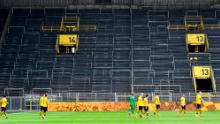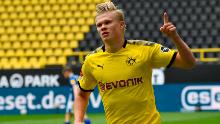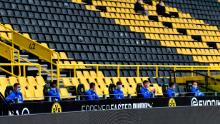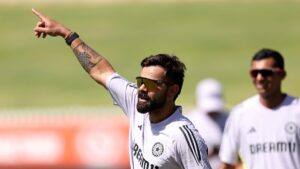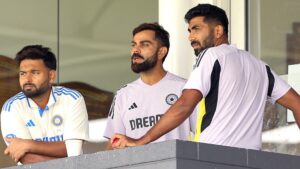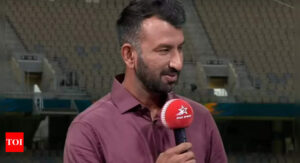Bundesliga marks soccer’s elite return, with changes, during coronavirus pandemic
While fans weren’t allowed — the most obvious difference to normal match days — the Bundesliga’s first five games no doubt boosted morale among those watching on television around the world who craved action in a top league. Not to mention the clubs themselves which desperately need the lucrative television money to operate and thrive.
The Bundesliga is the first major European soccer league to return to action, perhaps providing a template in some ways for how American sports leagues can proceed.
Germany’s top-flight division regularly attracts an average of 43,300 people every game, but these matches are being played behind closed doors.
The Bundesliga’s hiatus lasted nine weeks, with the three other elite soccer divisions in harder-hit countries in Europe — the UK’s Premier League, Spain’s La Liga and Italy’s Serie A — not yet providing a set date for their comebacks.
Germany, which has been praised for its handling of the pandemic, has reported over 173,000 coronavirus cases with nearly 8,000 deaths, according to the World Health Organization.
The Bundesliga enforced strict rules ahead of the restart.
“We’ve had so many other things to organize, to respect, and to solve,” FC Koln’s head of football, Frank Aehlig, said in a virtual press conference before this weekend’s games. “It’s completely different from what we know from our normal business.”
Teams spent a week in quarantine before games, shuttled players to stadiums in multiple buses rather than one, and more than one dressing room was used per team, too. Even then, social distancing rules had to be followed.
There were staggered warmups and teams entered the pitch at different times with no mascots, in another change.
Substitutes donned masks and sat not in the dugout but between the dugout and stands at Borussia Dortmund’s Signal Iduna Park, well apart from teammates. The match ball was disinfected prior to kickoff, presumably resulting in the referee appearing to enter the field last.
More than 80,000 fans would usually have roared on Dortmund against Schalke 04 in one of soccer’s fiercest rivalries but instead the lone sounds were coaches and players yelling out instructions and clapping encouragement and shrieks of pain from players when fouled.
First goal at Dortmund
The first goal came at Dortmund and from the most likely contender, Erling Braut Haaland.
The 19-year-old deftly deflected Thorgan Hazard’s cross with his left foot in the 29th minute as Dortmund thrashed Schalke 4-0 to move within a point of idle leader Bayern Munich.
He celebrated with a dance at a distance from his teammates, devoid of much noise.
When Dortmund medical staff attended to Haaland on the pitch in the second half, they also wore masks. A mask was given to Dortmund’s Thomas Delaney when he was substituted in the 67th minute.
The customary celebration post game from Dortmund players — arms being raised and lowered — happened but not while holding hands with teammates.
The new normal in soccer.
Things could change
Despite games proceeding as the Bundesliga seeks to complete the season, things could change at any moment.
If players test positive for the virus, matches will be canceled. It happened in the league’s second tier when two Dynamo Dresden players tested positive, prompting Sunday’s clash against Hannover to be scrapped.
Augsburg manager Heiko Herrlich missed Saturday’s 2-1 loss to Wolfsburg, meanwhile, for breaking quarantine rules when he bought toothpaste.
But Saturday’s play in the world’s most popular sport was bound to be respite for many, if only temporarily, as the coronavirus continues to rage.
“To have the possibility to discuss whether it was a penalty or not, to discuss whether it was a handball or not…all these things can bring back a little bit of normality for a few hours for a lot of people,” said Aehlig, whose side hosts Mainz on Sunday. “I hope it will give a positive feeling to people for their own lives.”

